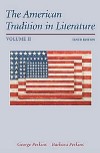"Tradition and the Individual Talent" is T. S. Eliot's early attempt to define an emerging literary theory. In the essay, he celebrates the literature of the past as an appropriate body of knowledge upon which the modern poet may draw and calls for the "continual extinction of personality" for a writer's work. He argues for a study of the independent work, set apart from the personality of the poet whose emotions and sensibilities may be something quite different from those that are manifested in the work itself. "To divert interest from the poet to the poem," writes Eliot, "is a laudable aim." "The Love Song of J. Alfred Prufrock" explores the bewilderment and the sense of personal disenfranchisement from traditional sources of meaning and value, two themes associated with the "modernist movement," given voice by a speaker who has "measured out his life in coffee spoons." "Gerontion," the speaker of the work by the same title, recites the "thoughts of a dry brain in a dry season," an old man with little chance for saving or salvation. "The Waste Land," perhaps Eliot's seminal work, extrapolates the themes of social devolution, individual disorientation and moral corrosion, and the collective mood of despair so symptomatic of the modernist world view. His tour d' force, "The Waste Land" draws upon a virtual library of comparative literature, readings including, among others, the Hindu Upanishads, Shakespeare, French and Italian classical poets, European medieval Grail legends, Christian-Judeo texts and the Holy Bible, the Confessions of St. Augustine, Sappho, Ovid, Homer, and Sir James Frazer's 20 volumes, The Golden Bough. Perhaps his directly expressive and accessible piece in the modernist mode including in our readings, Eliot's "The Hollow Men" projects life devoid of every living manifestation but the voice to express its anguish, "Shape without form, shade without colour, Paralyzed force, gesture without motion." |



 2003 McGraw-Hill Higher Education
2003 McGraw-Hill Higher Education